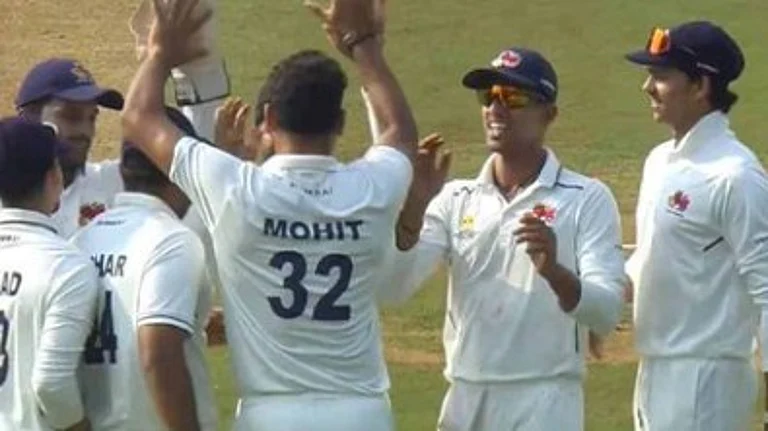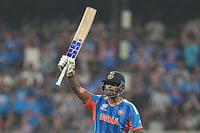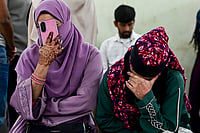Sir Vidiadhar Surajprasad Napaul -- in his own words, "an Indian fromIndia could look no more Indian than I do" -- has finally been grantedwhat many have said was better deserved by none: The Nobel Prize for Literature,the world's most prestigious and -- with a value of $943,000 -- richestliterary award. The announcement was made at noon today in Stockholm.
"I am utterly delighted, this is an unexpected accolade. It is a great tribute to both England, my home, and to India, home of my ancestors, and to the dedication and support of my agent Gillon Aitken," Naipaul said in a brief statement after receiving news of the award.
The academy said Naipaul was chosen for his "incorruptible scrutiny inworks that compel us to see the presence of suppressed histories". Theysingled out for particular praise The Enigma of Arrival (1987), callingit "an unrelenting image of the placid collapse of the old colonial rulingculture and the decline of European neighbourhoods".
Horace Engdahl, the head of the academy, who told Naipaul of the award byphone, said "He was very surprised and I don't think he was pretending. Hewas surprised because he feels that as a writer he doesn't represent anythingbut himself."
Naipaul was chosen by secret ballot from a shortlist of five. The rest of theshortlist remains shrouded in secrecy - nominees are not publicly revealed until50 years after the prize is awarded - but others rumoured to be in the reckoningincluded Israel's Amos Oz, South Africa's JM Coetzee, Canada's Margaret Atwoodand America's Philip Roth.
There had been some talk of suspending the award in the wake of the terroristattacks on America and the retaliatory strikes on Afghanistan, but Engdahl saidthe academy had quickly dismissed any such suggestion. "Literature is thebasis of a worldwide community, which is obviously not based on violence orhatred but which paves the way of mutual understanding between cultures andpeople. If any prizes at all should be distributed on a year like this, it oughtto be the literature prize and the peace prize - just to show the world thatthis patient process of bringing the nations together mustn't cease."
Political controversy has always dogged the award. Last year's winner, thelittle-known exiled Chinese novelist and playwright Gao Xingjian, now a Frenchcitizen, drew anger from China. Naipaul, though undeniably a giant on literarymerit alone, is no stranger to political controversy, particularly for hisnon-fiction. Be it his three India books (An Area of Darkness, 1964, India:A Wounded Civilization, 1977, or India: A Million Mutinies Now, 1990)or the two "Islamic" ones ("travels among converted people"as he calls them: Among The Believers: An Islamic Journey, 1981, and themore recent, much panned by the likes of Edward Said & co., Beyond Belief,1998)
Not to mention his inimitable interviews (for example, do see some of those on the right) that never fail to make the headlines (and at least amuse, apart from offering an incisive insight into the mind of the man). As the recent one, about a month or so ago, when without anynoticeable provocation, he launched into the work and reputations of E M Forster("a nasty homosexual . .. He encouraged people to lie. He was somebody who didn't know Indian people"), James Joyce ("unreadable" "blind writer"), CharlesDickens ("a self-parodist"), Henri Stendhal ("that flawed writer"), J M Keynes (He "didn'texploit poor people, he exploited people in the university; he sodomised themand they were too frightened to do anything about it"), Wole Soyinka("a marvellously establishment figure, actually") and the recentlydeceased R K Narayan ("his India is a ruin, he's writing about a ruin"), among many others, not even sparing Tony Blair (a pirateat the head of a socialist revolution "destroying the idea of civilisationin this country) and his New Labour ("itis terrible, this plebeian culture that celebrates itself").
But old Naipaulites, like Paul Theroux, explain that "gratuitousoutbursts such as this nearly always precede the appearance of a Naipaul work.In spirit, it is like a boxer's frenzy of boasting and threats before animportant match: in part a species of self- promotion in the form ofchest-thumping and shouted abuse, in part a suggestion of tactics."Whatever the motivation, grist supplied to the gossip mills keeps them churningfor days and weeks.
Barely had that controversy died down (and to be fair, one has to read the full interview to get the context rather than judge him by the rather sensationalist parenthetical projection I -- and those of my profession -- provide because it, well, makes for good copy) that last week, he ended up causing yetanother outcry by (yet again) comparing the "calamitous effect" ofIslam on the world with colonialism after a reading of his new book, Half aLife, at the Queen Elizabeth Hall in London.
Islam, he claimed, once again, had both enslaved and attempted to wipe outother cultures. "It has had a calamitous effect on converted peoples. To beconverted you have to destroy your past, destroy your history. You have to stampon it, you have to say 'my ancestral culture does not exist, it doesn'tmatter'." He claimed what he called "this abolition of the selfdemanded by Muslims was worse than the similar colonial abolition of identity.It is much, much worse in fact... You cannot just say you came out ofnothing." And as usual, Pakistan, he offered, was the living proof of thedamage Islam could wreak.
"The story of Pakistan is a terror story actually. It started with apoet who thought that Muslims were so highly evolved that they should have aspecial place in India for themselves. This wish to sift countries ofunnecessary and irrelevant populations is terrible and this is exactly whathappened in Pakistan."
Prompting many, including Ahmed Versi, editor of the Muslim News, to pointout that Naipaul's outbursts show just how deep his ignorance of Islam is."What he says may shock many people here, but it comes as no surprise tothose of us who have read his books. He is basically a Hindu nationalist, whohas a deep dislike of Muslims, and that is where he is coming from." One recallsSalman Rushdie's old snipe that he was beginning to sound like a poster boy for the BJP.
I am not sure that readers of his India books, the first two in particular, who still start frothing at themouth at his snide remarks about Hinduism, will necessarily agree, but perhaps they feel compensated for allthe derision heaped on Pakistan in particular since his travels in the Islamic world.
(Aside: at the same reading, when asked about the WTC attacks, a friendreports, he said he felt very pained, and added: "They publish my books inAmerica." When the audience laughed, he chided them: "They don'tpublish my books in Saudi Arabia or Egypt!" Needless to say, he was serious. Another friend commented: onemust give him credit for clarity of value systems.)
To be fair, Engdahl conceded that Naipaul might be seen as a political winner, but added:"I don't think we will have violent protests from the Islamic countries andif they take the care to read his travel books from that part of the world theywill realise that his view of Islam is a lot more nuanced. What he's reallyattacking in Islam is a particular trait that it has in common with all culturesthat conquerors bring along, that it tends to obliterate the precedingculture," he said. All those who actually read his books (rather than just the bookreviews or what Paul Theroux has to say, not about his books, but about the man) will agree, for sure.
But then Naipaul is critical of all religions, as the Academy board memberPer Wastberg told Reuters: "He considers religion as the scourge ofhumanity, which dampens down our fantasies and our lust to think and experiment".
Perhaps we can all say Amen to that one. Richard Dawkins would be pleased for sure, among millions of his otherfans who have grown up reading and hearing more about his fabled idiosyncrasies than actually readinghis books. The best tribute to the man would have to be to read him and to judge him by his own words, using his own methodology: "to look and to look again, to re-look and rethink."


























